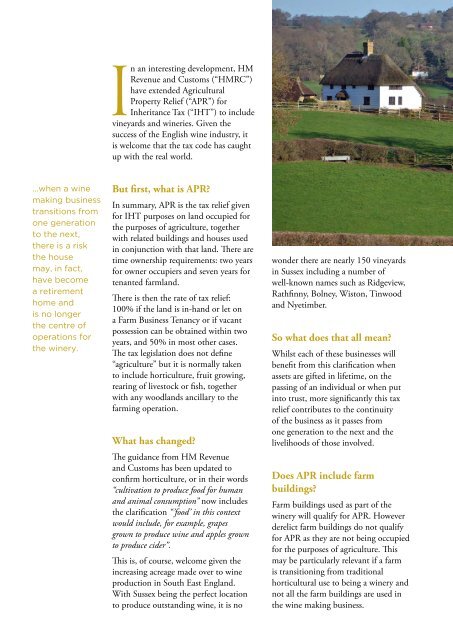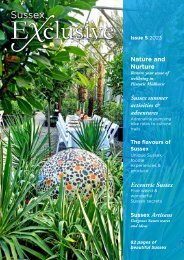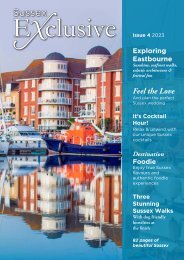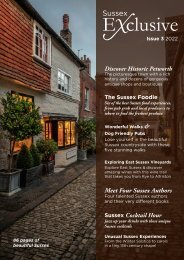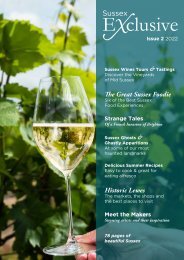Sussex Exclusive Magazine Issue 6 2023
In this edition, we are celebrating all things Christmas and New Year, Sussex wine and gin, and lots more. We have some great Sussex Christmas traditions (old and new) for you, a Brighton Christmas getaway, lots of Christmas gift ideas, and even more Christmas recipes, bakes, and treats. Of course, it's not all about Christmas and we also have the perfect (8) antidotes to help beat the January blues. And not a diet in sight! For the travellers and wanderlusters amongst you, we have a fabulous three-day road trip that follows in the footsteps of the Medieval pilgrims, has amazing views, and takes in castles, vineyards, and historic towns. Alternatively, you might want to hop across the channel and discover the Pays de Calais or throw caution to the wind with a luxury cruise around Iceland! Sussex is a great foodie destination with some amazing Sussex producers and foodie experiences. So grab a fork and tuck into mouthwatering recipes and some great foodie experiences. And discover more of our Sussex vineyards and spirit producers as we explore the history of the Sussex drink industry and taste a few favourites. You can always burn off any excesses with one of our warming winter walks. If that’s not enough, take our Sussex quiz, read our health advice and gardening tips, and check out our selection of things to do! And the really good news is that it's all completely free!
In this edition, we are celebrating all things Christmas and New Year, Sussex wine and gin, and lots more. We have some great Sussex Christmas traditions (old and new) for you, a Brighton Christmas getaway, lots of Christmas gift ideas, and even more Christmas recipes, bakes, and treats. Of course, it's not all about Christmas and we also have the perfect (8) antidotes to help beat the January blues. And not a diet in sight!
For the travellers and wanderlusters amongst you, we have a fabulous three-day road trip that follows in the footsteps of the Medieval pilgrims, has amazing views, and takes in castles, vineyards, and historic towns. Alternatively, you might want to hop across the channel and discover the Pays de Calais or throw caution to the wind with a luxury cruise around Iceland!
Sussex is a great foodie destination with some amazing Sussex producers and foodie experiences. So grab a fork and tuck into mouthwatering recipes and some great foodie experiences. And discover more of our Sussex vineyards and spirit producers as we explore the history of the Sussex drink industry and taste a few favourites. You can always burn off any excesses with one of our warming winter walks.
If that’s not enough, take our Sussex quiz, read our health advice and gardening tips, and check out our selection of things to do!
And the really good news is that it's all completely free!
Create successful ePaper yourself
Turn your PDF publications into a flip-book with our unique Google optimized e-Paper software.
In an interesting development, HM<br />
Revenue and Customs (“HMRC”)<br />
have extended Agricultural<br />
Property Relief (“APR”) for<br />
Inheritance Tax (“IHT”) to include<br />
vineyards and wineries. Given the<br />
success of the English wine industry, it<br />
is welcome that the tax code has caught<br />
up with the real world.<br />
no longer the centre of operations for the<br />
winery. The next generation may need to<br />
occupy the house if they are continuing<br />
the family winery business with the older<br />
generation moving to a different and<br />
perhaps smaller property on the vineyard<br />
or elsewhere.<br />
What are the APR dangers?<br />
...when a wine<br />
making business<br />
transitions from<br />
one generation<br />
to the next,<br />
there is a risk<br />
the house<br />
may, in fact,<br />
have become<br />
a retirement<br />
home and<br />
is no longer<br />
the centre of<br />
operations for<br />
the winery.<br />
But first, what is APR?<br />
In summary, APR is the tax relief given<br />
for IHT purposes on land occupied for<br />
the purposes of agriculture, together<br />
with related buildings and houses used<br />
in conjunction with that land. There are<br />
time ownership requirements: two years<br />
for owner occupiers and seven years for<br />
tenanted farmland.<br />
There is then the rate of tax relief:<br />
100% if the land is in-hand or let on<br />
a Farm Business Tenancy or if vacant<br />
possession can be obtained within two<br />
years, and 50% in most other cases.<br />
The tax legislation does not define<br />
“agriculture” but it is normally taken<br />
to include horticulture, fruit growing,<br />
rearing of livestock or fish, together<br />
with any woodlands ancillary to the<br />
farming operation.<br />
What has changed?<br />
The guidance from HM Revenue<br />
and Customs has been updated to<br />
confirm horticulture, or in their words<br />
“cultivation to produce food for human<br />
and animal consumption” now includes<br />
the clarification “’food’ in this context<br />
would include, for example, grapes<br />
grown to produce wine and apples grown<br />
to produce cider”.<br />
This is, of course, welcome given the<br />
increasing acreage made over to wine<br />
production in South East England.<br />
With <strong>Sussex</strong> being the perfect location<br />
to produce outstanding wine, it is no<br />
wonder there are nearly 150 vineyards<br />
in <strong>Sussex</strong> including a number of<br />
well-known names such as Ridgeview,<br />
Rathfinny, Bolney, Wiston, Tinwood<br />
and Nyetimber.<br />
So what does that all mean?<br />
Whilst each of these businesses will<br />
benefit from this clarification when<br />
assets are gifted in lifetime, on the<br />
passing of an individual or when put<br />
into trust, more significantly this tax<br />
relief contributes to the continuity<br />
of the business as it passes from<br />
one generation to the next and the<br />
livelihoods of those involved.<br />
Does APR include farm<br />
buildings?<br />
Farm buildings used as part of the<br />
winery will qualify for APR. However<br />
derelict farm buildings do not qualify<br />
for APR as they are not being occupied<br />
for the purposes of agriculture. This<br />
may be particularly relevant if a farm<br />
is transitioning from traditional<br />
horticultural use to being a winery and<br />
not all the farm buildings are used in<br />
the wine making business.<br />
And what about the owner’s<br />
house?<br />
The test for whether the owner’s house is<br />
of “character appropriate to the property”<br />
requires consideration of four factors:<br />
• Is the house appropriate by reference<br />
to its size, content and layout with the<br />
winery buildings and the size of the<br />
vineyard?<br />
• Is the house proportionate in size<br />
and nature to the requirements of the<br />
winery?<br />
• Would the educated rural layman<br />
regard the house as the core of the<br />
winery or just a large country house<br />
with land purchased for lifestyle<br />
reasons?<br />
• How long has the house been<br />
associated with the land and is there a<br />
history of horticulture?<br />
The winery owner’s house should<br />
therefore qualify for APR if of a character<br />
appropriate to the vineyard, provided<br />
it is where the wine making business is<br />
controlled from.<br />
Also, when a wine making business<br />
transitions from one generation to the<br />
next, there is a risk the house may, in fact,<br />
have become a retirement home and is<br />
There are some. The most obvious in a<br />
wine making business is APR will not be<br />
available if there is a binding contract for<br />
sale of the property in the partnership<br />
or shareholders agreement, but this can<br />
usually be avoided by having in place buy<br />
and sell option agreements.<br />
What if the farmland and<br />
buildings have development<br />
value?<br />
APR is only given for the agricultural<br />
value of the property as opposed to<br />
the open market value of the property.<br />
Sometimes these amounts are the<br />
same but sometimes HMRC insist on<br />
agricultural value being 60-70% of open<br />
market value even though there is no such<br />
standard discount. Each case will need to<br />
be considered on its merits.<br />
If, however, the land has hope or<br />
development value, particularly if the<br />
vineyard is next to a built up area or<br />
could be the next strategic site in a local<br />
authority approved plan, the excess value<br />
over the agricultural value will not attract<br />
APR. The position may however be saved<br />
by Business Property Relief, another form<br />
of tax relief for Inheritance Tax relief<br />
purposes, if the land is used in the owner’s<br />
own trading business.<br />
Conclusion<br />
Wineries can be very Inheritance Tax<br />
efficient as well as providing a meaningful<br />
and joyous lifestyle.<br />
Stuart Ritchie<br />
is a chartered<br />
accountant and<br />
chartered tax<br />
adviser with over<br />
30 years’ experience.<br />
He is a tax partner<br />
with Ritchie Philips<br />
LLP based in<br />
Horsham and can<br />
be contacted on<br />
020 3195 1300<br />
or stuart.ritchie@<br />
ritchiephillips.<br />
co.uk<br />
He has direct<br />
experience of<br />
securing CGT<br />
exemption for<br />
gardens sold for<br />
development,<br />
multiple buildings<br />
qualifying as a<br />
single dwelling<br />
for CGT purposes<br />
so that sale of<br />
subservient<br />
buildings are CGT<br />
exempt, and the<br />
sale of properties in<br />
excess of 10 acres all<br />
qualifying for CGT<br />
exemption.<br />
73


